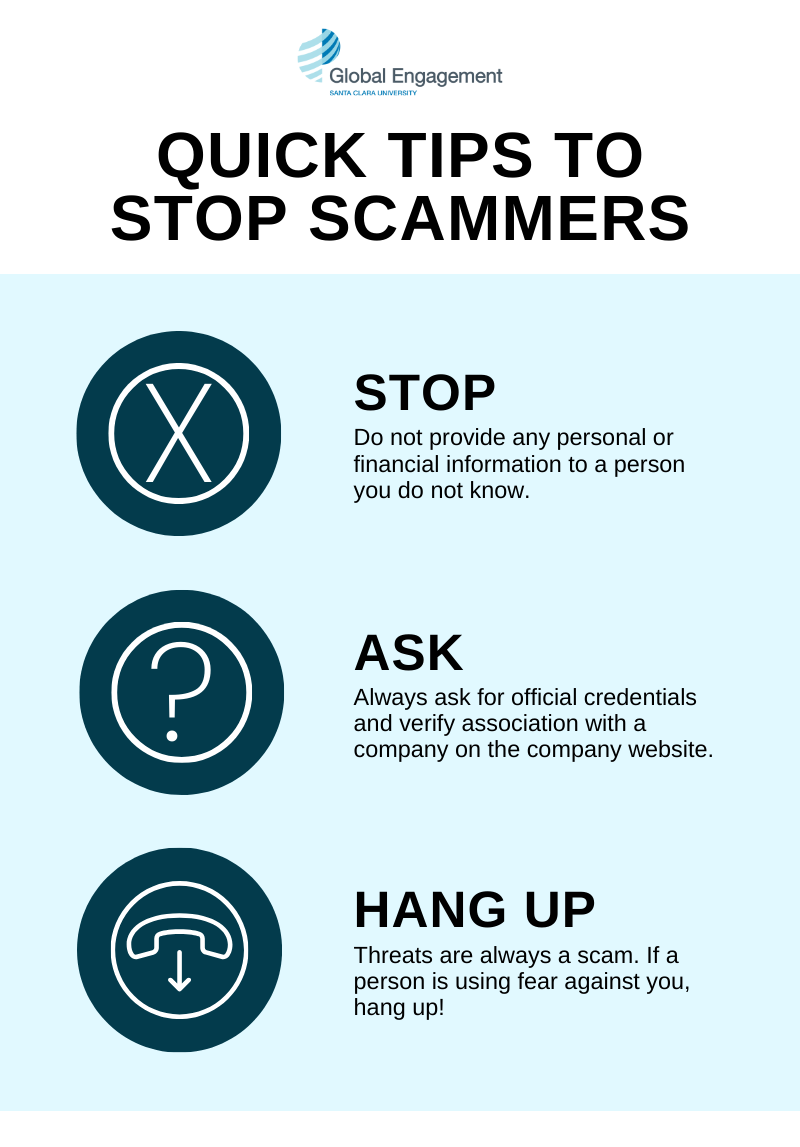Fraud calls and messages can happen to anyone, at anytime. Every year, international students across the U.S. become victims of scams and fraud. Read through our information on how to best protect yourself from scams and fraud while you are in the U.S.
Helpful Definitions
What is fraud? What are scams? Knowing some key terms can help you better understand what these crimes are, and how to spot them.
| Term | Definition |
|---|---|
| Fraud | unauthorized access to personal information without the victim's knowledge or consent |
| Scam | manipulating victims into willingly providing their information |
| Phishing | a scammer impersonates a business or a person to trick victims into giving out their personal information, such as passwords, credit card numbers, or bank account information |
| Scammer | a person or organization who commits fraud and organizes scams |
| Caller ID Spoofing | a caller disguises the information shown on caller ID to trick victims into thinking they are from a specific location or organization |
| Identity Theft | someone steals a victim's identity to commit fraud, including name, Social Security number, bank account information, or credit card number |
| Mail Fraud | a letter asking victims to send money or personal information now to get something valuable after they send the money or information |
| Security Freeze | freezes credit-related accounts, such as bank accounts, to prevent scammers from opening new accounts in a victim's name |
| Robocall | answering the phone and hearing a recorded message instead of a live person |
Tips to Identify Scams
Scams targeting international students are often predictable and can sound genuine. Explore our tips on how to identify scams:
- Remember that U.S. government officials (from immigration or tax agencies) will never:
- Threaten to arrest or deport you on the phone.
- Ask you for personal financial information
- Tell you to immediately send or wire transfer money
- Callers asking for personal identifying information such as full legal name, address, SSN, credit card, or bank information are likely scammers.
- Research the organization or individual who called you to see if they are a legitimate employee or group.
- Listen to examples of robocall scams to become familiar with their techniques.
Tips to Avoid Scams
There are some actions you can take to prevent yourself from becoming a victim of a scam. Ways to avoid scams include:
- Never provide personal identifying information such as full legal name, address, SSN, credit card, or bank information over the phone.
- Remove personal contact information (like your phone number) from social media such as LinkedIn and Facebook.
- If something seems like it’s not right it probably isn’t. It’s better to be cautious than to be a victim of a scam.
- Contact our office about a suspicious call or message, and take no action until we verify the call.
Common Scams
Scams and fraud attempts can be creative. Be aware of some common types of scams, and follow each link to learn more information about the type of scam:
- Immigration
- Social Security Number
- Employment
- IRS/Taxes
- Bank/Checks
- Crime/Kidnapping
- Housing
- Cryptocurrency
*Note: linked resources are from external sites and companies, and do not indicate endorsement from SCU
Reporting Resources
If you are a victim of a scam, contact ISS immediately, and we will help you with the next steps for reporting a scam.
